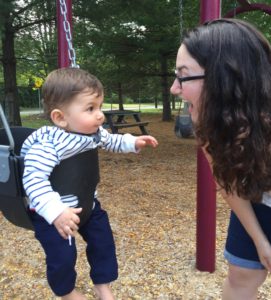
As your baby becomes more interactive, remember to respond to her attempts to communicate with you. This builds a healthy attachment and provides her with a strong foundation in her emotional development. Here are a few suggestions to help her confidence and self-esteem.
1. Talk to your baby throughout the day, including her in what you are doing by narrating and explaining all day long.
2. Introduce your baby to new people and let her see that you trust the person before you expect your baby to trust the new person.
3. Make eye contact with her when you are speaking or engaging with her. Take note that she is returning the eye contact during conversation, diaper changes, baths, massages, and regular interactions.
4. Take note of what interests him and encourage that. If he looks toward a toy, help him reach it and talk to him about it while he plays with it.
5. Make him laugh as often as possible. Be silly, have tickle parties, play peek-a-boo, pretend to eat his fingers, blow raspberries on his belly and make his stuffed animals talk to him.
6. Respect her space. Maybe your baby is easily over-stimulated or scared of strangers or crowds. Give her a nap before company comes over, keep her close to you and talk her through it. No matter her age, she understands your calming voice even if she doesn’t understand the words.
7. Respond to his feelings. When he is upset, give him a cuddle. When he giggles, giggle with him. This is both reinforcing and great for his self-esteem.
References:
Loehr, J., Meyers, J. (2009). Raising Your Child: The Complete Illustrated Guide. Fair Winds Press.
Zero to Three, (2018). The Growing Brain. Zero to Three
The American Academy of Pediatrics

